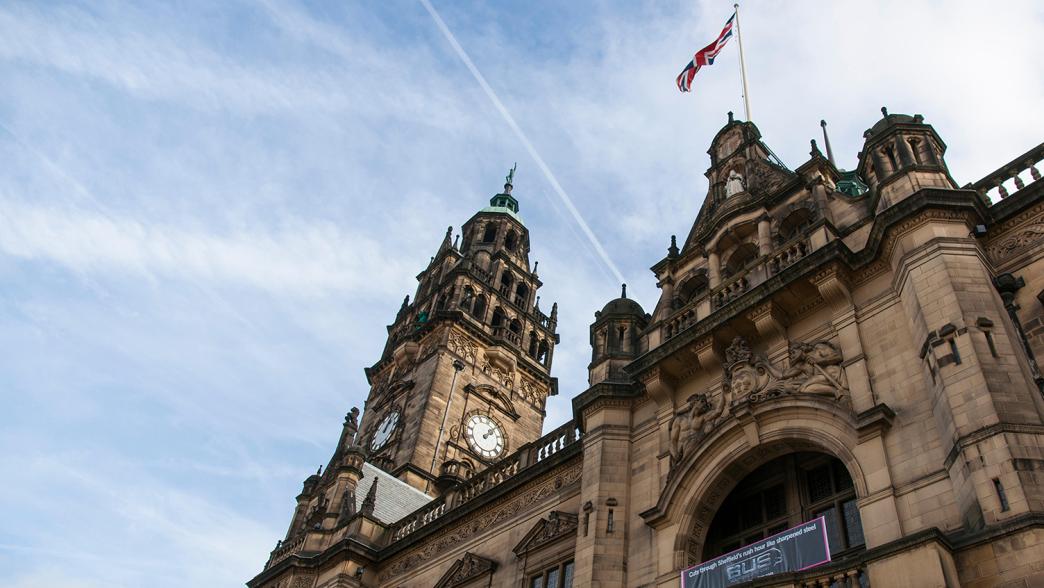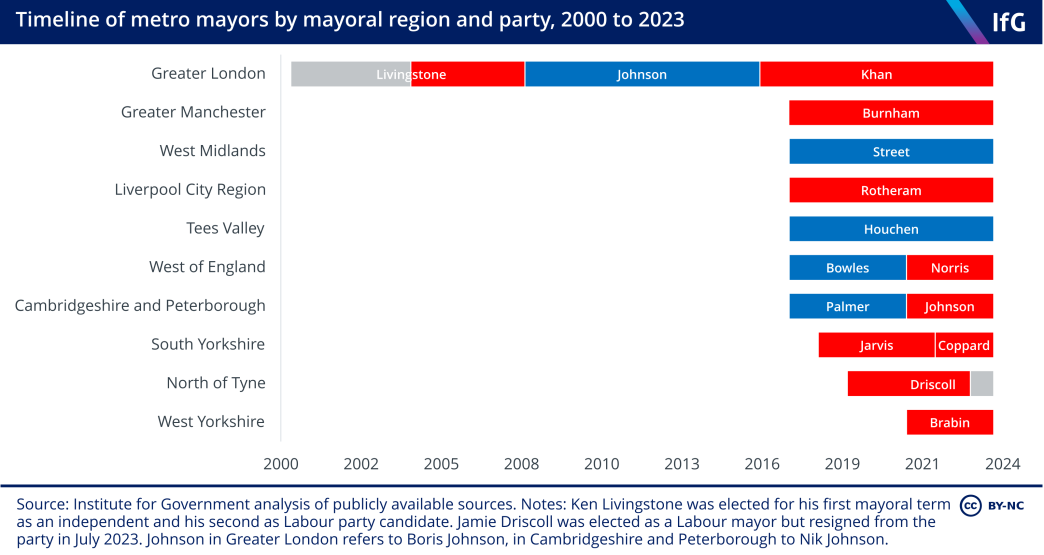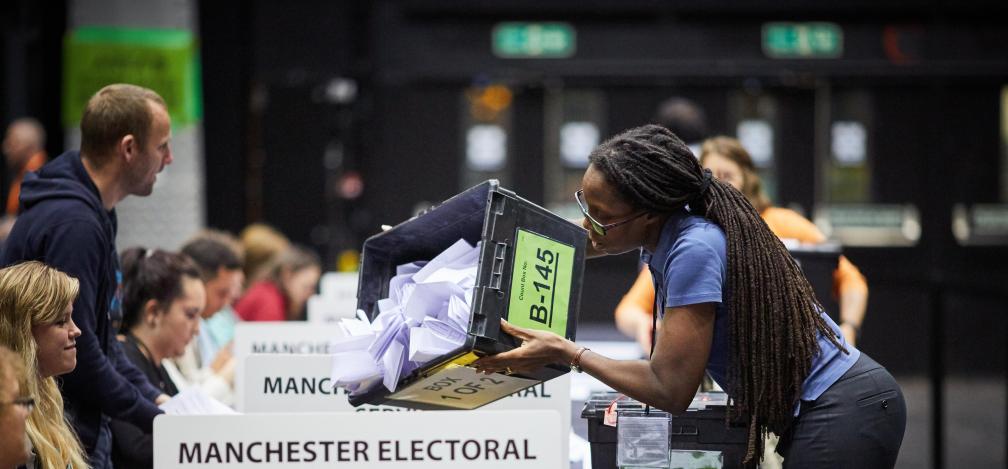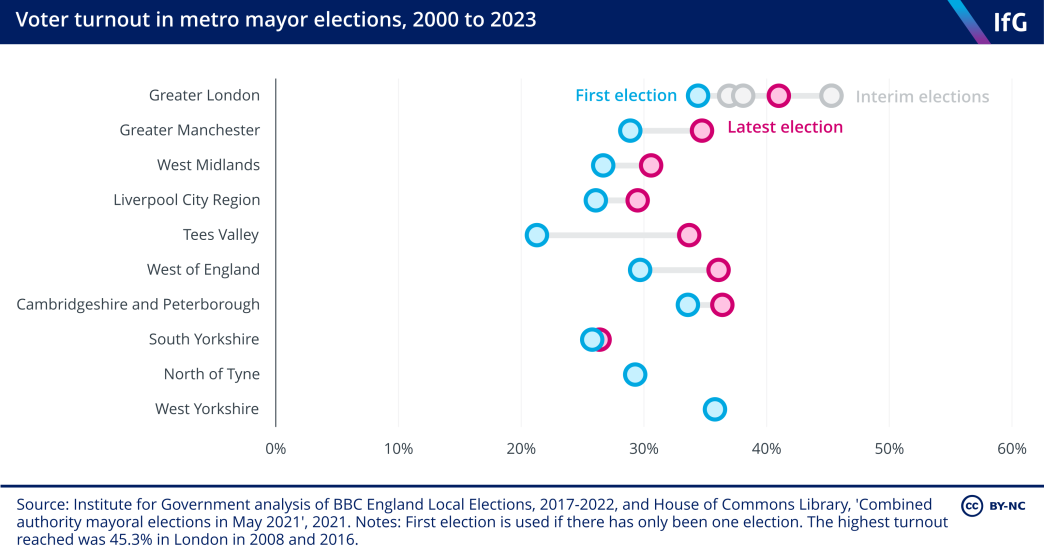Metro mayors and the 2024 mayoral elections
On 2 May 2024, voting will take place for 10 metro mayors across England. How will this process work?

On 2 May 2024, voting will take place for 10 metro mayors across England, who will collectively control upwards of £25bn of public spending. This will be the biggest set of devolved elections in England ever to take place on a single day, with the mayors elected covering approximately 44% of the English population.
Who are England’s metro mayors?
Metro mayors are directly-elected leaders who chair combined authorities to which powers have been devolved from Whitehall. There are 10 metro mayors at present (including the Mayor of London, which has a different devolution model), a figure that will rise to 12 in May 2024. To date, 15 different people have held the post of metro mayor somewhere in England.

Of the 10 elections on 2 May 2024, three are for new posts; in York and North Yorkshire, the East Midlands, and the North East, where the North of Tyne combined authority is being absorbed into a new larger regional authority. In addition, elections are taking place for the existing mayoral posts in South Yorkshire, West Yorkshire, Tees Valley, Greater Manchester, Liverpool City Region, West Midlands and London.
The deadline for voter registration is 12 working days before polling day, which is Tuesday 16 April 2024.
Who are the candidates for the 2024 elections?
There are 62 candidates for metro mayor across the 10 elections. The Tees Valley election has the lowest number of candidates, with three nominated. The election with the highest number is in London, where 13 candidates are vying to become mayor.
The other elections all have either five or six candidates. The Conservative Party, the Labour Party and the Liberal Democrats are contesting every mayoral election. The Green Party are contesting nine, while Reform UK is standing in five.
Seven incumbent mayors are standing for re-election for their current post: Sadiq Khan, Andy Burnham, Andy Street, Steve Rotheram, Ben Houchen, Oliver Coppard and Tracy Brabin. In addition, the current independent mayor of North of Tyne, Jamie Driscoll is standing for the new post of mayor of the North East against Labour’s candidate Northumbria police and crime commissioner Kim McGuinness.
There will definitely be two new mayors. The York and North Yorkshire contest sees North Yorkshire councillor Keane Duncan (Conservative) take on businessman David Skaith (Labour) as well as three fellow North Yorkshire councillors (Green Party, Liberal Democrat and independent candidates) and independent candidate Keith Tordoff.
The East Midlands sees Conservative MP and Nottinghamshire council leader Ben Bradley compete with Labour’s Claire Ward, previously an MP and junior minister, as well as independents and candidates from the Green Party, Liberal Democrats and Reform UK.
What was the process to become a candidate for metro mayor?
Candidates required a nomination paper signed by 100 local voters, including at least 10 from each constituent council. 40 The Combined Authorities (Mayoral Elections) Order 2017 sch 1 Pt 3 para 8(1). If there were more than 10 constituent councils, the number of signatures required rose to 10 times the number of councils. 41 The Combined Authorities (Mayoral Elections) Order 2017 sch 1 Pt 3 para 8(2). For London, 330 signatures were required, including 10 from each borough and the City of London. 42 The Greater London Authority Elections Rules 2007 sch 3 Pt 3 para 7(1).
Candidates must have delivered nomination papers by 4pm on Wednesday 27 March 2024 in London and Friday 5 April 2024 elsewhere. The returning officer published the statement of persons and parties nominated by 4pm 18 working days before the election (or by noon, 22 days before for London). 43 The Combined Authorities (Mayoral Elections) Order 2017 sch 1 Pt 2 para 3; The Greater London Authority Elections Rules 2007 sch 3 Pt 2 para 3.
Candidates also had to give a deposit of £5,000, or £10,000 if standing in London. 44 The Combined Authorities (Mayoral Elections) Order 2017 sch 1 Pt 3 para 10; The Greater London Authority Elections Rules 2007 sch 3 Pt 3 para 9(1).
Political parties ran their own selection processes to choose their candidate, with the details determined by internal party rules. When selected, candidates submitted a certificate of authorisation from the party with their nomination papers.
Mayors do not need to be from a political party. Two metro mayors (Ken Livingstone and Jamie Driscoll) have been independent during some of their mayoral tenure.
Do metro mayors have to live in the local area?
Candidates for metro mayor must have a qualifying address. This means they must be a registered voter in, live in, own land or property in, or work within the combined authority geography (including for a year before nomination and on polling day). 45 The Combined Authorities (Mayoral Elections) Order 2017 sch 1 Pt 3 para 6(7)-(9); Greater London Authority Act 1999 s 20.
There is no requirement to be born or to grow up in the local area, nor is there a requirement to be a British citizen. 46 Local Government Act 1972 s 79; Greater London Authority Act 1999 s 20. However, previous and current metro mayors often stand in areas they have enduring links to. Of the 15 mayors, at least seven were born within their combined authority area. Others, such as Andy Street and Dan Norris, grew up in the area they now represent despite not being born there.
Local and mayoral elections 2024
On Thursday 2 May, voters across England and Wales will head to the polls in a major set of mayoral and local elections. Keep up with our latest content, events and analysis on why these elections matter and the results when they come.
Find out more
What disqualifies you from running for metro mayor?
Candidates are unable to run for metro mayor if they are currently employed by the combined authority or a constituent council. 53 The Combined Authorities (Mayoral Elections) Order 2017 sch 1 Pt 3 para 9(b); Greater London Authority Act 1999 s 21. They also must not hold a politically restricted post, for example as a statutory chief officer of a local authority. 54 The Combined Authorities (Mayoral Elections) Order 2017 sch 1 Pt 3 para 9(b); Greater London Authority Act 1999 s 21.
Candidates might be restricted from running if they have been imprisoned depending on length of sentence and whether there was option of a fine, if they are subject to a debt relief or bankruptcy restriction order, if they have been found guilty for illegal or corrupt electoral practices (within certain time restrictions), or if they are subject to the notification requirement of or under part 2 of the Sexual Offences Act 2003. 55 The Combined Authorities (Mayoral Elections) Order 2017 sch 1 Pt 3 para 9(b); Greater London Authority Act 1999 s 21-21A.
Mayors who exercise police and crime commissioner (PCC) functions cannot simultaneously serve as a Member of Parliament, or hold other roles such as being a member of the Civil Nuclear Constabulary. 56 Police Reform and Social Responsibility Act 2011 c. 20 s 64-68.
How are mayors elected?
Mayoral elections will use first past the post (FPTP) following the Elections Act 2022. 57 Elections Act 2022 c. 37.
The last metro mayor election was in May 2022 in South Yorkshire, while eight (including Greater London) were held in 2021.
Turnout at mayoral elections is generally lower than at general elections. Turnout rose in all cases between the first and second elections. The average turnout across the eight 2021 mayoral elections was 35%. Turnout was highest in London (41%) and lowest in the Liverpool City Region (30%). 58 Elise Uberoi, ‘Combined authority mayoral elections 2021’, House of Commons Library, 25 May 2021, retrieved 12 February 2024, commonslibrary.parliament.uk/research-briefings/cbp-9237/; Brigid Francis-Devine, ‘London Elections 2021’, House of Commons Library, 21 May 2021, retrieved 12 February 2024, commonslibrary.parliament.uk/research-briefings/cbp-9231/.

What prior political experience do metro mayors typically have?
Most mayors have some political experience before taking on the role. Eight of the 15 previous or current metro mayors had been MPs before they were elected as mayors, and nine had been local councillors (four had held both roles). Only Andy Street and Oliver Coppard were neither an MP nor a councillor before being elected mayor.
Local councillors must stand down if elected as metro mayor, but MPs need not unless they also hold police and crime commissioner functions. Tracy Brabin, whose West Yorkshire Combined Authority encompasses the PCC role, had to stand down as MP for Batley and Spen, 62 James Vincent, ‘Tracy Brabin: 'Enormous privilege' to be first female metro mayor’ BBC News, 10 May 2021, retrieved 12 February 2024, www.bbc.co.uk/news/uk-england-leeds-57054332. but Dan Jarvis, mayor of South Yorkshire from 2017-21, remained an MP throughout. 63 Liz Roberts, ‘Dan Jarvis: MP to step down as South Yorkshire Mayor’ BBC News, 20 September 2021, retrieved 12 February 2024, www.bbc.co.uk/news/uk-england-south-yorkshire-58626488.
At what ages have metro mayors taken office?
The minimum age to become a metro mayor is 18. The youngest age that a metro mayor has taken office is 30, the oldest 61.
What are metro mayors paid?
Mayors’ salaries vary. The average salary of the 10 current mayors is £92,063. The mayor of Greater London has the highest salary at £154,963 a year, and the Tees Valley and North of Tyne mayors have the lowest salaries at £65,000 a year.
Mayors cannot vote on their own salary, so rely on their combined authority members voting on whether to accept the recommendations of an Independent Renumeration Panel (IRP). Previous IRPs have considered other mayors’ salaries, police and crime commissioners’ salaries and MP salaries as comparators. 64 Liverpool City Region Combined Authority, ‘Report of the Independent Renumeration Panel: Metro Mayor renumeration 2022-4’, no date, retrieved 12 February 2024, liverpoolcityregion-ca.moderngov.co.uk/documents/s62266/Enc.%201%20for%20Independent%20Remuneration%20Panel%20-%20Metro%20Mayor%20Remuneration.pdf
- Topic
- Devolution
- Position
- Metro mayor
- Publisher
- Institute for Government